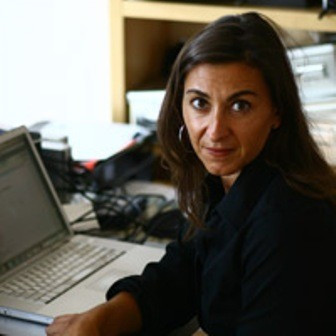IBTimes Exclusive: Pregnant U.S. Photographer Lynsey Addario Talks About 'Cruel' Treatment in Israel

Meet Lynsey Addario, a Pulitzer-winning news photographer who says being a woman works in her favor when she is out covering war zones infamous for gross ill-treatment of women.
Female war photographers or reporters are not the anomalies they are perceived to be. But the unfortunate truth is that in popular media, their gonzo journalistic exploits tend to be noticed only after they have been subjected to physical assault or violent abuse.
Addario feels it grossly offensive if someone questions her competence, having born with the additional and supposed disability of being a woman, in covering war zones like her male peers. Her photographs and reporting ought to have the last say in this matter; her portfolio is hugely impressive, containing as it does, images from dangerous regions in the Middle East and Africa.
The dangers of war zones are self-evident and they do not respect gender. Addario was one of four journalists who went missing in Libya on March 16. She and her colleagues -- Tyler Hicks, Stephen Farrell and Anthony Shadid -- were freed by the Moammar Gadhafi government after six days of captivity.
They were subjected to incredibly intense and violent physical assault during the captivity, she said. Addario said she was groped repeatedly while Gadhafi's soldiers held her blindfolded and her hands and feet were tied with shoelaces.
Nevertheless, she refuses to be put off by numerous obstacles that stand between her and the images she captures, which play their role in deciding nations' destinies. That is why she took up a recent assignment, for The New York Times, in Israel, while she was 27 weeks pregnant.
What Addario experienced was something more blatantly cruel than anything she had ever faced, she said. She was forced by Israeli security personnel at a Gaza checkpoint to go through an X-ray machine thrice, despite her request to forgo those particular checks because of her pregnancy. She was then ordered into a room where a female worker asked her to strip down to her underwear, according to an AP report.
While Addario did not demand special treatment from the Israeli government and did not underestimate the importance of security checks, particularly in sensitive zones like Gaza, does the fact that she is a citizen of Israel's most important ally make her treatment all the more inappropriate?
I would say that it does not matter whether or not Israel is an ally of the U.S. Security concerns are present for the Israeli government, and they must take necessary measures to protect their borders, Addario told IBTimes.
That said, this does not justify the ill-treatment of a New York Times journalist, credentialed by the Israeli government, who had called ahead to notify them she was coming through the Erez crossing, and had concerns about going through the full-body scanner while 27-plus weeks pregnant, she added.
Their soldiers were unprofessional, gratuitously rude, and clearly were making a mockery of my request to avoid the X-ray by making me pass through three times before leading me to a room, and asking me to remove my pants and lift up my shirt while a female soldier checked me through what I imagine is armored glass, she said.
The Israeli Defense Ministry issued an apology on Monday, responding to a letter written by Addario on Oct. 25 complaining of the treatment.
We would like to apologize for this particular mishap in coordination and any trouble it may subsequently have caused to those involved, the statement read.
Addario compares her recent experience to the six days of captivity in Libya: I would have to admit that I am more forgiving of the Libyan soldiers who bound my colleagues and me, beat us, and held us for six days, simply because those soldiers were completely ignorant, she said. They had no experience with foreign media or free press due to the repression under Moammar Gadhafi's regime, and had been told repeatedly since the start of the uprising in Libya through Col. Gadhafi's public speeches that all foreign journalists were spies and members of al-Qaida.
This in no way condones the Libyan soldiers' violent behavior, she said. The Israeli government and Israeli soldiers are extremely educated, and exposed to the international press corps, and know very well the norms and respect with which credentialed, international media should be treated.
© Copyright IBTimes 2025. All rights reserved.






















